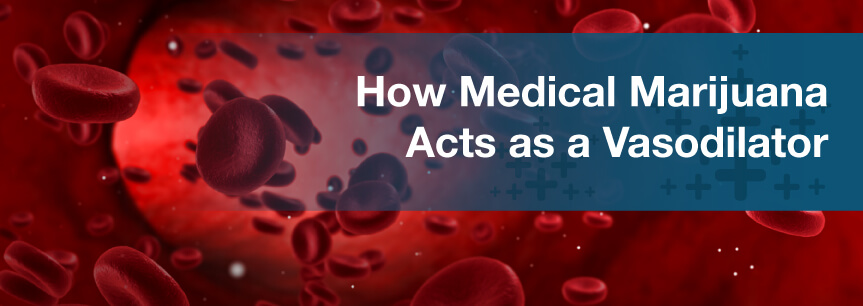
While many patients and caregivers are familiar with the most common side effects of medical weed, such as giddiness and hunger, most are unaware of the beneficial effect of tetrahydrocannabinol (THC) as a vasodilator, which influences the treatment of several conditions, including glaucoma.
A vasodilator is any substance that causes vasodilation, which is the widening of your blood vessels to improve blood flow to other parts of your body, such as your heart. While vasodilation also occurs naturally within the body, such as when you’re feeling faint, vasodilators are a part of modern medicine.
For example, you can treat high blood pressure with vasodilators — by expanding your blood vessels, your blood pressure decreases. Unlike prescription medications, however, medical cannabis is a natural vasodilator that interacts with your body’s receptors to initiate vasodilation.
Due to federal and state laws, it’s difficult for researchers to provide a specific answer as to why medical cannabis acts as a vasodilator. Like many of its effects, however, scientists believe it’s tied to the endocannabinoid system (ECS), which features cell receptors that bind with cannabinoids, like THC, to create a reaction.
As an example, consider this interaction of the ECS and cannabinoids in pain management. You consume medical marijuana, such as through smoking, and your body begins to process the medical weed. During that process, cannabinoids activate ECS receptors throughout your body to regulate reactions, such as chronic pain.
Because of limited research opportunities, scientists are aware of only some of the instances where medical marijuana-induced vasodilation treats conditions and helps patients resume their daily lives or regain a sense of normalcy in their day-to-day activities.
Conditions that respond well to vasodilation include:
With more research, scientists expect to discover additional beneficial uses of medical weed as a vasodilator.
Incorporating medical weed into your treatment plan for its role as a vasodilator offers several benefits, including:
If you’re considering using medical pot because it’s a vasodilator, talk to your medical marijuana doctor first.
At MarijuanaDoctors.com, we give families and patients valuable, up-to-date information on medical marijuana. From research studies and legislation changes to qualifying conditions and side effects, we compile and deliver it in a compact, easy-to-understand form for you and your family.
To learn more about medical cannabis and vasodilation, explore our resource library and blog!